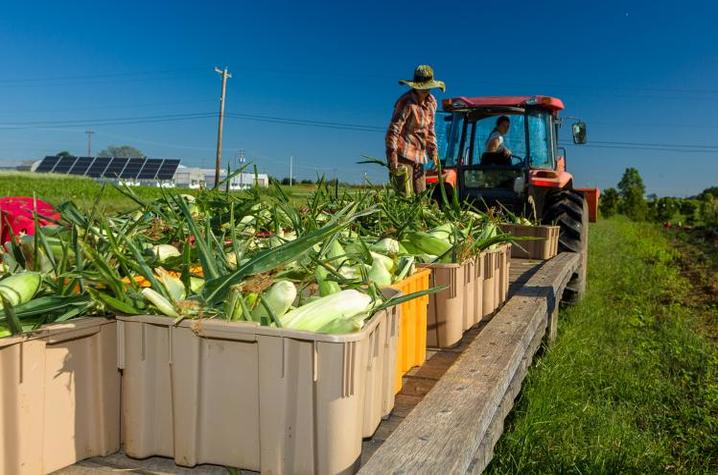UK Researchers Partner With National Group to Help CSAs Thrive

LEXINGTON, Ky. (Feb. 26, 2019) — University of Kentucky researchers are part of a national group working to increase opportunities and the economic viability of Community Supported Agriculture operations. A CSA is a subscription-based program where consumers buy “shares” in a farm’s output throughout a growing season.
Tim Woods and Jairus Rossi, faculty in the UK College of Agriculture, Food and Environment, are partnering with seven CSA technical assistance groups from across the nation to develop a community of practice for CSAs so they can more easily share marketing innovations and other best practices. The community of practice will allow all of the partners to combine their own extensive marketing expertise and resources for the betterment of CSA farmers across the United States.
“We have a unique opportunity to build a knowledge-sharing network between organizations with innovative approaches to CSA,” said Rossi, an assistant research professor in the college’s Community and Economic Development Initiative of Kentucky. “By providing space for collaborations, we can facilitate the exchange of hard-won lessons and novel ideas between service providers across the nation.”
In CSAs, members purchase their share at the beginning of the season with the understanding that they will take part in the bounty or lack thereof with the producer. This model is a win-win for producers and consumers as it helps take some of risk out of farming by providing producers with a stable income, while at the same time CSA members receive benefits from receiving farm fresh fruits and vegetables each week during the growing season.
In recent years, CSAs have faced marketing challenges including nationwide market stagnation, retention rates and competition from CSA-like services. Many of these issues are related to consumers’ lack of education about CSAs and their benefits.
“We have been growing and marketing organic produce through the CSA system since 2005 and have noticed over the past few years that there is an increasing trend toward modifying traditional CSA models,” said Mark Williams, interim chair of the UK Department of Horticulture and director of the college’s organic farming unit. “It seems that this CSA community of practice could be a substantial step forward in increasing CSA production while addressing key challenges for growers.”
The three-year project is led by the Wisconsin FairShare Coalition and is funded by a nearly $500,000 grant from the U.S. Department of Agriculture’s Local Foods and Promotion Program. The California-based Community Alliance with Family Farms is also a key partner on the project. Additional collaborators include CSA technical assistance programs in New York, the Metropolitan Washington Council of Governments, Oregon and Michigan. All partners have developed innovative ways to address CSA marketing challenges in their areas.
“The project will bring all of these resources together and allow us to address challenges that CSAs face as a group. This includes ways to access non-traditional markets like employer wellness programs and virtual shoppers, as well as new approaches to managing the CSA business in an effort to strengthen retention rates,” said Woods, UK extension professor in the Department of Agricultural Economics. “Engaging with the community will always be a central tenet, but there are many creative ways to do this, and we want to be able to freely share ideas.”
Partners will offer strategies on marketing, retention rates, workplace wellness and employer-based programs, farm business management, health and wellness discount programs and ways to increase access to low-income individuals and families. Ultimately, results from this project will give U.S. farmers greater access to these new and innovative strategies to grow their businesses.
Woods and Rossi are developing the community of practice for the grant. UK is renowned for developing innovations in both CSA production and marketing, having developed a number of nationally recognized resources for CSA producers with varying experience levels. Directors of UK’s student-run CSA farm have developed a detailed breakdown of business costs for small- to medium-sized CSAs. UK researchers continue to study the potential health benefits of CSA participation and employer return on investment associated with partial sponsorship of CSAs as part of worksite wellness programs.




